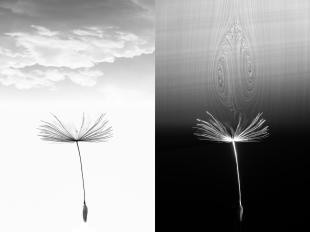In the next decade, distributed sensor network systems made of insect-scale flying sensors will enable a step change in monitoring natural disasters and remote areas. They will contribute to protecting the environment by providing data on the contamination of physical and biological systems and on the impact of human activities. To date, a key limitation of this technology is that small drones such as the robobee can remain airborne only for few tens of minutes.
By contrast, some natural flyers such as the dandelion fruit, travel unpowered for days and hundreds of kilometres. Recent work led by the Principal Supervisor of this project and published in Nature (https://edin.ac/385DnRY), revealed that the dandelion adopts a highly porous wing to form a new fluid vortex that has never been observed before, and to increase its aerodynamic efficiency by an order of magnitude.
This project aims to translate these biological insights into the design, manufacturing and test of a man-made flyer, the dandidrone, capable of remaining airborne exploiting only the energy in the wind. The dandidrone will be passively transported by the wind and will record data while flying. Novel manufacturing principles combining nature-inspired selective metallisation techniques and 3D printing/doctor blading of soft materials will allow a step change in the manufacture of soft robotics. Prototypes will be tested in a first-of-its-kind wind tunnel at the University of Edinburgh as part of a complementary project funded by the European Research Council.
These new capabilities of insect-scale drones will enable new business opportunities and attract investments from industry. Several companies have already expressed their eagerness to collaborate to this project, including Leonardo, the biggest suppliers of defence equipment to the UK Ministry of Defence, which will contribute to the project as an industrial advisor.
This project will complement the activities within the ERC project ‘Dandidrone’ (H2020 ERC CoG 2020), a €2M five-year project led by the Principal Supervisor that started in June 2021. The project also builds on a recently completed Leverhulme Trust (RPG-2015-255, £341k) project “The Form & Function of the Dandelion Fruit”.
The supervisory team includes Dr Ignazio Maria Viola, Head of the Vortex Interaction Laboratory (VOILab, http://voilab.eng.ed.ac.uk) at the University of Edinburgh, and Prof. Marc Desmulliez at Heriot-Watt University. Desmulliez’s research group is involved in the design of novel manufacturing technologies and sensor technologies. He co-authored over 500 publications and holds 9 patents. He successfully graduated 35 PhD students and is currently the manager of the Medical Device Manufacturing Centre and Director of the Nature Inspired Manufacturing Centre.
Further Information:
https://voilab.eng.ed.ac.uk/phd
https://voilab.eng.ed.ac.uk/dandidrone
https://researchportal.hw.ac.uk/en/persons/marc-phillipe-yves-desmulliez
The University of Edinburgh is committed to equality of opportunity for all its staff and students, and promotes a culture of inclusivity. Please see details here: https://www.ed.ac.uk/equality-diversity
Closing Date:
Principal Supervisor:
Assistant Supervisor:
Eligibility:
Minimum entry qualification - an Honours degree at 2:1 or above (or International equivalent) in a relevant science or engineering discipline, possibly supported by an MSc Degree. Further information on English language requirements for EU/Overseas applicants.
Funding:
Applications are welcomed from self-funded students, or students who are applying for scholarships from the University of Edinburgh or elsewhere.
Tuition fees + stipend are available for Home/EU and International students.



